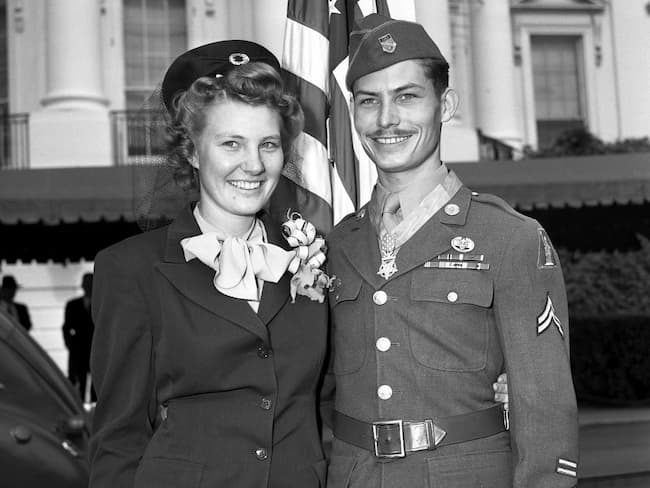Desmond Doss. In the midst of one of the fiercest battles of World War II, more than 70 years ago, an unexpected hero saved the lives of numerous American soldiers. His story is currently exploding on global movie screens. It received six Oscar nominations and took home two. Get more of Desmond’s life story.
Desmond Doss Biography
Desmond Doss was a United States Award-winning Army corporal who served in World War II as a combat medic with an infantry company.
He received the Bronze Star Medal twice for his actions in Guam and in the Philippines. Doss went on to save 75 men during the Battle of Okinawa, becoming the only conscientious objector to receive the Medal of Honor for his actions during the war.
Education
Doss attended the Park Avenue Seventh-day Adventist Church school until the eighth grade, after which he went to work for the Lynchburg Lumber Company to help support his family during the Great Depression.
Desmond Doss Religion
Corporal Doss is presented as a balanced, Sabbath-keeping, vegetarian, Bible-believing Christian who was moved by faith in God to adhere to his biblical beliefs in the face of overwhelming opposition during the Battle of Okinawa.
Desmond Doss Family
Desmond was the son of carpenter William Thomas Doss (1893-1989) and homemaker Bertha Edward Doss (née Oliver) (1899-1983). His mother raised him as a devout Seventh-day Adventist, instilling in him Sabbath observance, nonviolence, and a vegetarian lifestyle. He grew up in Lynchburg, Virginia, with his older sister Audrey and younger brother Harold in the Fairview Heights neighborhood.
Desmond Doss Wife and Son (Second Wife)
On August 17, 1942, Doss married Dorothy Pauline Schutte, and they had one child, Desmond “Tommy” Doss Jr., in 1946. His wife Dorothy died in a car accident on November 17, 1991, while being driven to the hospital by Desmond. Desmond remarried Frances May Duman on July 1, 1993.
Clinic
In his honor, the United States Army Health Clinic-Schofield Barracks in Hawaii has renamed the Desmond T. Doss Health Clinic on May 7, 2019. Desmond Doss Jr. and other family members were present to honor his father’s legacy.
How many men did Desmond Doss Rescue?
An estimated 75 men remained behind, too injured to flee on their own. He would not abandon them. Doss successfully rescued 75 men trapped at the escarpment’s top by lowering them using a special knot he knew. He had miraculously avoided injury and remained in the fight with B Company.
At the Military
Doss worked as a joiner in a shipyard in Newport News, Virginia, before the start of World War Two. On April 1, 1942, in Camp Lee, Virginia, he decided to enlist in the military despite being given the option to defer due to his shipyard employment. He was ordered to Fort Jackson in South Carolina to train with the 77th Infantry Division, which had been reactivated. Harold, his brother, was stationed on the USS Lindsey during this time.
Why didn’t Desmond Doss carry a gun?
Because of his personal beliefs as a Seventh-day Adventist, Doss refused to kill an enemy soldier or carry a weapon into battle. As a result, he was assigned to the 2nd Platoon, Company B, 1st Battalion, 307th Infantry, 77th Infantry Division as a medic.
What illness did Desmond Doss have?
Doss was diagnosed with tuberculosis in 1946, which he had contracted on Leyte. He was hospitalized for five and a half years, losing a lung and five ribs, before being released in August 1951 with 90% disability. Doss continued to receive military treatment, but after an antibiotic overdose left him completely deaf in 1976, he was awarded 100% disability; he was able to regain his hearing after receiving a cochlear implant in 1988. Despite his injuries, Doss was able to raise a family on a small farm in Rising Fawn, Georgia.
Did Desmond Doss find his Bible?
Desmond was wounded and received a plaster cast on his entire upper body at the battalion aid station before being transported to the hospital ship in an ambulance over a bumpy Okinawan road. Desmond discovered his Bible, which Dorothy had given him, was missing when he arrived at the dock.

Desmond told the ambulance driver he wanted his Bible and insisted that the driver tell his friends at the battalion aid station to look for his Bible, which contained Dorothy’s letter. He didn’t realize how hopeless that was in his state of mind. Several months later, while recuperating at the Army hospital in Swant tonoa, North Carolina, he received a letter from his friend, Sergeant Howell, in which he learned that his buddies had discovered his Bible! When word reached his battalion, the entire company went out to find it and found it.
Desmond couldn’t help but reflect on what those men had done and what it meant. They must love and respect him as well. He also believed that these men’s search for his Holy Bible had brought them closer to God. The Bible was sent to Dorothy, and despite being waterlogged and with its cover falling off, he eventually had it rebounded. Desmond’s last lesson, dated May 26, 1945, was still tucked inside.
Death
Doss died on March 23, 2006, at his home in Piedmont, Alabama, after being hospitalized for difficulty breathing. On April 3, 2006, he was laid to rest in the Chattanooga National Cemetery in Tennessee. Frances passed away on February 3, 2009, at Piedmont Health Care Center in Piedmont, Alabama.
Story
Desmond assumed when he joined the Army that because he was a conscientious objector, he wouldn’t have to carry a weapon. He wanted to be a combat medic in the Army. He was fortunate enough to be assigned to an infantry rifle company. His refusal to convey a weapon brought a great deal of hardship among his kindred fighters. They looked down on him and called him an outcast. “Doss, as soon as we get into combat, I’ll make sure you won’t come back alive,” a man in the barracks told him.
The slender Virginian who spoke with a soft southern drawl was also wanted by his superiors. They perceived him as a drawback. Nobody thought it was worth it for a soldier to fight without a weapon. They declared him mentally unfit for the Army, intimidated, reprimanded, and assigned him additional difficult responsibilities. Then, at that point, they endeavored to court military him for denying an immediate request — to convey a firearm. However, they neglected to figure out how to throw him out, and he wouldn’t leave. He held the belief that his duty was to serve his country and obey God. However, it had to be done that way. The most crucial thing was his unwavering convictions.
Desmond had a firm belief in the Bible from an early age. He personally upheld the Ten Commandments when it came to living a holy life. His father had purchased a large, framed picture at an auction when he was young. The Ten Commandments were depicted with vibrant illustrations. A drawing of Cain holding a club and standing over the body of his deceased brother Abel was placed next to the words “Thou shalt not kill.” When Little Desmond saw that picture, he would wonder, “Why did Cain kill Abel?” How on earth could a brother behave in such a way?” God told Desmond, “If you love me, you won’t kill,” in Desmond’s head. He made the decision that he would never take his own life with that image permanently imprinted in his mind.
Desmond, on the other hand, took a different commandment just as seriously as the sixth. The fourth commandment was it. His religious upbringing included going to church on the seventh day of the week. When the Army found out that he had yet another personal need, they were irritated. He requested a weekly pass so that he could regularly attend church on Saturdays. He was hit twice as a result of this. This Bible-reading puritan was seen by his fellow soldiers as completely out of touch with the rest of the Army. As a result, they bullied him, ostracized him, abused him, and cursed at him. His chiefs likewise made his life troublesome.
When the men discovered that this quiet, unassuming doctor had a method for healing the blisters on their tired marching feet, things started to change. Additionally, this doctor was by the patient’s side and offered his own canteen in the event of heat stroke-induced fainting. Desmond never resented anyone. He treated those who had wronged him with kindness and politeness. “…do to others what you would have them do to you…” is the golden rule that he lived by (Matthew 7:12 NIV).
On Guam, Leyte, and Okinawa, Desmond participated in combat. He demonstrated extraordinary devotion to his fellow soldiers during each military operation. He was busy saving lives while others took their own. He never gave his own safety any thought when the “medic” call went out on the battlefield. In order to treat a fallen comrade and carry him back to safety, he repeatedly ran into the fighting. All of this took place as mortar shells exploded around him and enemy bullets flew past. Desmond was so close to enemy lines while treating a wounded soldier several times that he could hear Japanese voices whispering.
Japanese troops were ferociously defending the only barrier (Okinawa and the Maeda Escarpment) against an allied invasion of their homeland in May 1945, as German troops surrendered on the other side of the world. Desmond’s division’s men kept trying to take the Maeda Escarpment, which the soldiers called Hacksaw Ridge because of its massive rock face. After the organization had gotten the highest point of the bluff, the Americans were paralyzed when unexpectedly foe powers hurried them in a horrendous counterattack. The police demanded an immediate retreat. The soldiers rushed to descend the steep cliff again. One soldier in particular.
Only about a third of the men were able to descend again. The remainder were abandoned and, if not already dead, lying wounded and dispersed on enemy soil. To save as many of his men as possible before either collapsing or dying trying, one lone soldier defied orders and returned to the firefight. On May 5, 1945, his Sabbath, his unwavering courage and unwavering determination saved at least 75 lives.
In the long run, the Americans took Hacksaw Edge. Okinawa was taken one bloody inch at a time. Desmond was severely wounded a few days later during an unsuccessful night raid. Concealing in a shell opening with two marksmen, a Japanese projectile arrived at his feet. He flew away after the explosion. The shrapnel attacked his leg and up to his hip.
He regarded his own injuries decently well. He was struck by a sniper’s bullet, shattering his arm, as he tried to escape. He did his brave thing as a combat medic. However, not before insisting that his litter-bearers rescue another man first. Even though he was injured, in pain, and bleeding, he still prioritized the safety of others. He would decide to kick the bucket so another could live. After all, he knew that from his Bible. Jesus Christ demonstrated this kind of character.
Desmond Doss Book
Four biographical books have been written about Doss:
• 2004 – The Unlikeliest Hero: The Story of Desmond T. Doss, Conscientious Objector Who Won His Nation’s Highest Military Honor. Mountain View, CA: Pacific Press Publishing Association. ISBN 978-0-8163-2048-6.
• 2015 – Desmond Doss Conscientious Objector: The Story of an Unlikely Hero
• 2016 – Redemption at Hacksaw Ridge: The Gripping True Story That Inspired The Movie
• 2017 – The Birth of Hacksaw Ridge: How It All Began
READ MORE Karen Hunter Bio, Age, Husband, Parents, Net Worth, Podcast, Books

